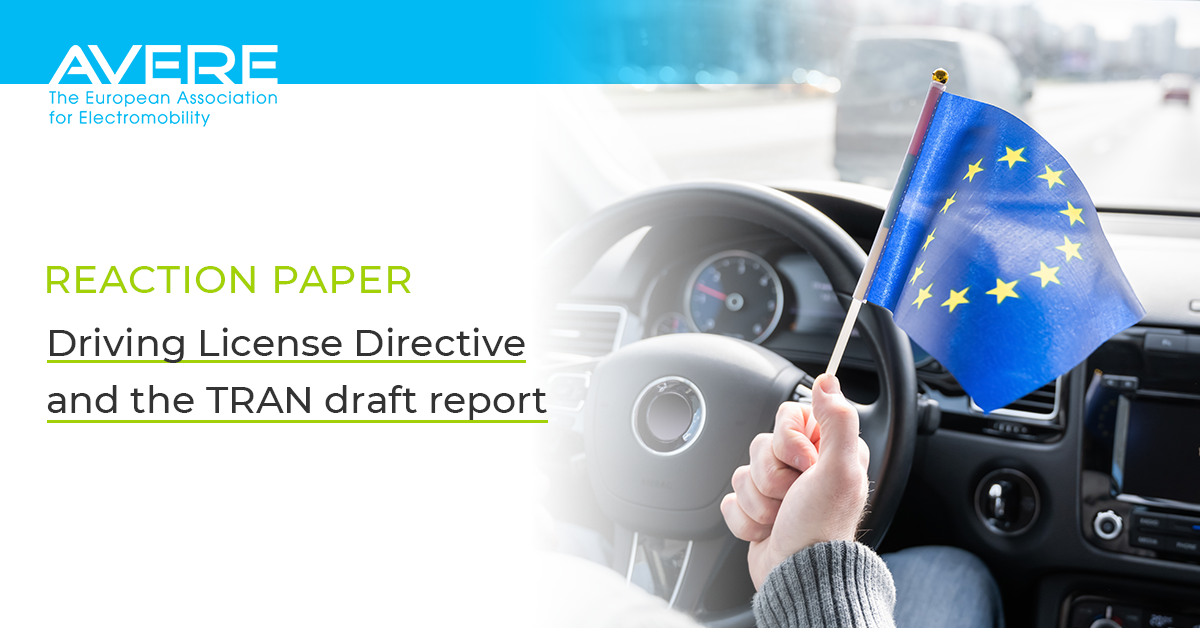
AVERE welcomes the proposal by the European Commission to review the Driving Licence Directive to take account of the specific nature of zero-emission mobility, which is set to increase significantly in Europe with the 2035 objective of phasing-out internal combustion engines.
REACTION PAPER
to the Driving License Directive and the TRAN draft report

AVERE welcomes the proposal by the European Commission to review the Driving Licence Directive to take account of the specific nature of zero-emission mobility, which is set to increase significantly in Europe with the 2035 objective of phasing-out internal combustion engines.
The initial Commission proposal made significant improvements to the existing Directive by allowing Category B drivers to be allowed to drive alternatively fuelled vehicles with a maximum authorised mass above 3 500 kg but not exceeding 4 250 kg without a trailer thus introducing a harmonised EU-based blanket additional allowance of 750kg for zero-emission vehicles in order to take into account the additional weight of batteries.
However, the draft report proposed by the Transport Committee’s rapporteur contains provisions that have the potential to negatively impact the future of e-mobility, notably by creating a new category of driving licence (Category B+) for vehicles weighing over 1.8 tons, subject to the obligation to hold a category B driving licence for at least two years.
In this context, AVERE suggests the following recommendations:
1. Allow Category B drivers to drive zero-emission vehicles with a maximum authorised mass above 3 500 kg but not exceeding 4 250 kg without a trailer
In light of the roll-out of battery electric vehicles on European roads to support the decarbonation of the road transport, AVERE reminds of the necessity of allowing Category B drivers to drive alternatively fuelled vehicles with a maximum authorised mass above 3 500 kg but not exceeding 4 250 kg without a trailer as proposed by the European Commission. Introducing new driving licence categories (e.g. Category B+) or diminishing of the proposed Commission’s provision would significantly hinder the uptake of e-mobility. This proposal would indeed encourage younger drivers to drive petrol and diesel cars instead of battery electric vehicles which are heavier by nature. Since newer models tend to be heavier, this is likely to lead young drivers to opt for second-hand diesel and petrol vehicles. Therefore, this proposal not only puts at risk the effort of the European Union to decarbonise road transport, but it also reduces the safety of younger drivers, as they would be prohibited from driving newer vehicles with functionalities which make them safer, such as new radar and detection systems, automatic breaks, driving assistance, etc.
It should additionally be noted that an increasing number of OEMs are moving to more sustainable battery chemistries, namely Lithium iron phosphate batteries, which do not use cobalt or nickel. Although these batteries are more environmentally sustainable and are less prone to imports from third countries, they tend to be heavier than the traditional ones. As such, the changes proposed by the rapporteur in the TRAN Committee would force OEMs to go back to legacy batteries and put at risk the strategic autonomy objectives of the European Union.
2. Remove the two years probationary period prohibiting young drivers holding a Category B licence of less than two years to drive zero-emission vehicles with a maximum authorised mass above 3 500 kg but not exceeding 4 250 kg without a trailer
In addition to the above recommendations, we strongly recommend removing the necessity for drivers to hold a driving licence for two years before being able to drive alternatively fuelled vehicles with a mass above 3,5 tonnes. Indeed, if Europe wants to make the logistic industry both attractive to young workers and sustainable, AVERE believes it would be pivotal to allow young drivers to drive electric vans and small trucks.
